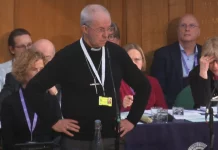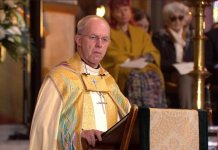The latest attempt by the Church of England Evangelical Council (CEEC) to hold up the launch in November of services of blessing for same-sex couples has little chance of becoming reality.
Ahead of the General Synod meeting in York in July, CEEC is circulating a paper by Dr Andrew Goddard, tutor in Christian ethics at CofE theological college, Ridley Hall, Cambridge. He says same-sex blessings, called in CofE parlance “Prayers of Love and Faith”, which were approved by simple majorities in the three Houses of Synod (Bishops, Clergy, and Laity) at February’s meeting, should be put to a vote requiring two-thirds majorities.
Goddard’s argument is that, “as this is clearly a highly contentious issue”, the “only defendable option” is for the bishops to follow Canon B2 of the CofE’s rules, which “requires Synod’s scrutiny and enhanced majorities” for new services.
Unfortunately, that tactic was tried in February and failed. The Rev Patrick Richmond of Norwich diocese moved an amendment requesting that a draft of the services be brought to General Synod “for approval prior to publication”.
Though this amendment succeeded in the House of Laity by 104 votes to 96, it fell in the House of Bishops by 39 to 4 and in the House of Clergy by 106 to 94. Measures need a majority in all three Houses to pass, so by 241 votes to 202 Synod effectively voted itself out of the Prayers of Love and Faith drafting process and passed the buck to the bishops.
The Prayers of Love and Faith bus has departed and there is nothing CEEC can now do to stop it. At the pre-Synod press briefing on June 22, the Bishop of London, Sarah Mullally, said the new services “are on track for November”. CofE evangelicals now belong to a denomination whose leadership has forsaken the traditional Christian sexual ethic and has earned the condemnation of the overwhelming majority of the worldwide Anglican Communion for doing so.
Officially the services will be optional. But there is a certain a lack of clarity about the decision-making process for parishes. Will clergy be able to use them without approval by Parochial Church Councils (PCCs) or will the services require a PCC vote?
Will curates (assistant clergy) serving in churches whose PCCs have approved the services be allowed to opt out of taking them on conscience grounds? What about clergy in teams serving several churches with perhaps differing views on the services? Episcopal clarity on such issues is awaited.
Do Anglican evangelicals wish to remain in such a denomination?
Read it all in Christian Today.










